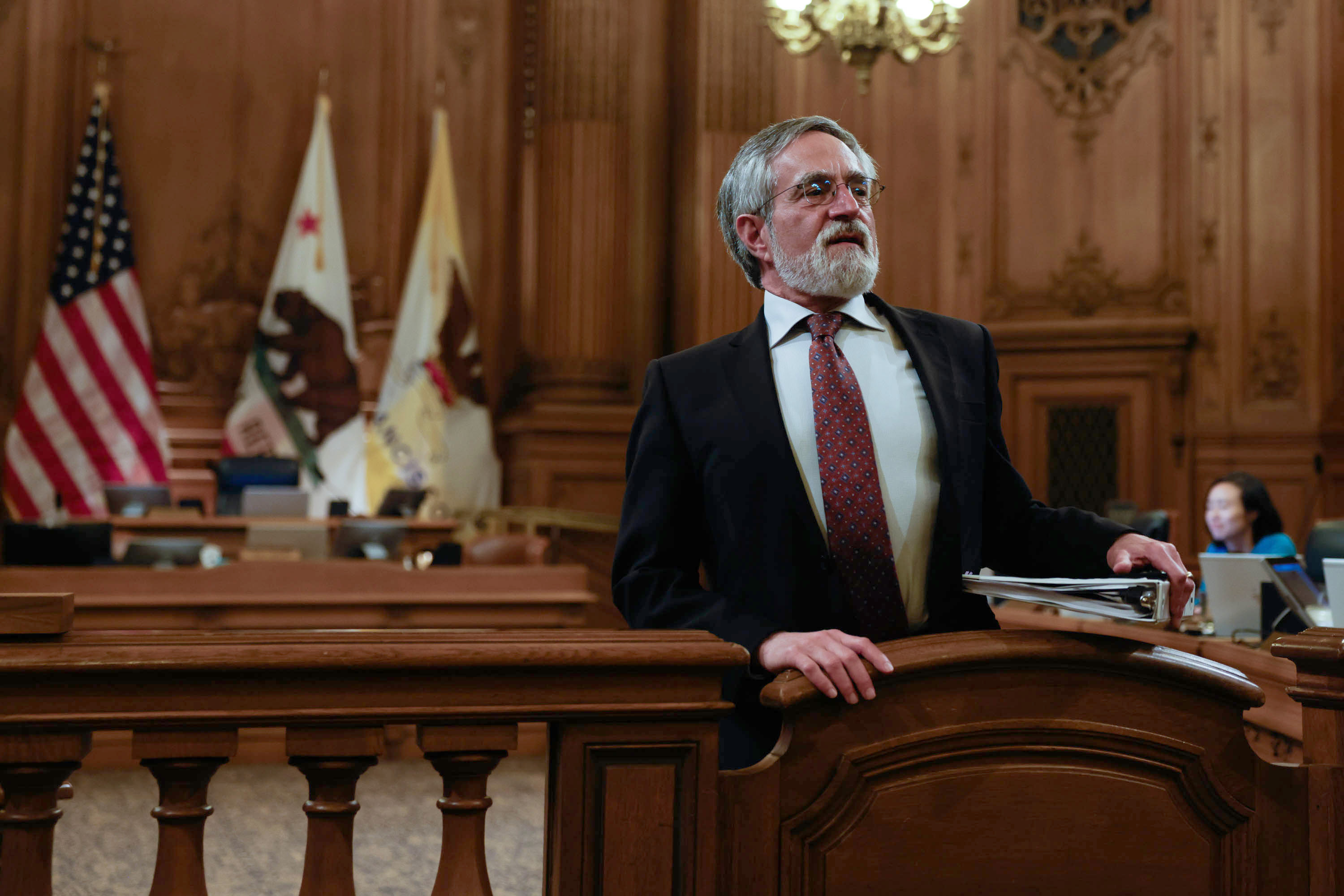After a March primary election that was dominated by public safety, the upcoming mayoral contest appears to be quickly pivoting to another issue San Franciscans often disagree on.
You guessed it: Housing. And, for now, the people clamoring to build more of it are on the back foot.
On Tuesday, seven supervisors stood behind Board President Aaron Peskin and his legislation that seeks to preserve a handful of blocks in Telegraph Hill, an area home to some buildings dating back to the Gold Rush era.
The supervisors who supported the expected mayoral candidate in his housing bill—and struck down an earlier veto from Mayor London Breed—included those who are not even staunch allies of Peskin.
“All politics and no policy,” Supervisor Rafael Mandelman described the situation during Tuesday’s meeting—a surprising barb thrown at the mayor. “The area actually at issue here is tiny.”
The moment was a defeat for Breed, who promised in her State of the City speech this month that she would block any legislation that crossed her desk she deemed as “anti-housing.” For Breed, the veto may go down as a political gamble that offers Peskin—or another progressive challenger in the mayoral race—a leg up this November.
It also marked a setback for YIMBYs, who have racked up considerable political wins in recent years but are now facing more resistance—even from some lawmakers in the city’s moderate camp.
What happened?
At the end of February, the board approved Peskin’s housing legislation in an 8-3 vote, with Supervisors Joel Engardio, Myrna Melgar and Matt Dorsey dissenting.
The legislation comes after Peskin and Breed last summer teamed up to encourage housing development in the northeastern corner of the city through the streamlining of office space to residential conversions.
However, Peskin says state law would have allowed for extra-large residential towers to bulldoze areas he considers vital to the city’s past: the Jackson Square and Northeast Waterfront historic districts. His efforts come after a spate of moves that have angered his critics, including being the sole vote in favor of blocking a redevelopment project in Pacific Heights in February.
“Housing will get built, developers will still make sizable profits, but the reality is that they won’t be able to destroy the very things that make San Francisco so special. Today good planning won out over bad politics,” Peskin wrote in a statement after Tuesday’s vote.
Peskin’s critics see his recent housing moves as an effort to appeal to a still-sizable constituency in San Francisco: preservation-minded residents who feel that denser housing taxes infrastructure and tarnishes neighborhood character, even if they agree with moderates on issues like public safety.
“There’s a piece of the moderate coalition that’s at stake here,” said longtime San Francisco political consultant Jim Ross. “Which are homeowners.”
Breed sees things differently, describing Peskin’s recent moves as anathema to her goal to build more housing in the city—she even stated she was “tired of his shenanigans” at a rally in front of City Hall. She vetoed Peskin’s bill this month with the hopes that one supervisor may have sided with her to keep her blockade intact.
That gambit failed Tuesday after an identical 8-3 vote took place—with supervisors who sided with Peskin claiming Breed’s move was purely political, the legislation was small in scope and the Planning Commission had given its thumbs up.
The squabble even plunked itself into state politics, with state Sen. Scott Wiener claiming in an opinion piece penned for The Standard that Peskin’s bill was the latest in a long line of efforts to skewer housing production in the city.
Former Mayor Art Agnos fought back in an article with the Examiner, claiming YIMBYs like Wiener were pushing for “a radical one-size-fits-all approach promoted by calculating special interests in Sacramento who care nothing about our city.”
Housing emerges as a key wedge in November
Tuesday’s vote was a speed bump for Breed, who is facing low poll numbers and a tough reelection battle.
The beginning of March offered her momentum when three of Breed’s propositions during the March primary saw success—while a rousing win for moderates at the local Democratic County Central Committee further solidified her political base.
“I’m disappointed, but not surprised,” said Jake Price, an organizer for the YIMBY-oriented Housing Action Coalition in San Francisco, in an interview after the vote. “If we can’t agree to build housing in affluent neighborhoods adjacent to the downtown we want to revitalize, where can we build housing?”
Breed’s veto—and her promise during her State of the City address—firmly validated her allyship with the YIMBY coalition, which has historically backed Breed but hasn’t yet made endorsements for November.
But in a crowded field of contenders, Breed’s moderate opponent, former Supervisor Mark Farrell, may see a path to victory without the backing of dedicated pro-housing voters.
Farrell rankled YIMBYs last week when he told Mission Local’s Joe Eskenazi that housing development should be focused on already-dense areas like downtown, a move that may have cost him support among pro-housing advocates. YIMBYs want to see denser housing in neighborhoods in the western and northern parts of the city.
Farrell told The Standard that he, too, would have vetoed Peskin’s bill. Daniel Lurie, the nonprofit leader and Levi’s heir also running for mayor did not respond. Supervisor and mayoral candidate Ahsha Safaí voted for Peskin’s legislation.
“We’ve been waiting to hear Mark Farrell say more about housing. Now that he has, it’s clear he has no grasp of our housing shortage and YIMBY voters see right through this nonsense,” said YIMBY Action’s Jane Natoli.
“That’s a tension that you’re starting to see play out here,” Ross said. “You have the YIMBY groups … but when you look at where you get the votes to become mayor, you have a lot of voters who don’t necessarily agree with those positions.”
